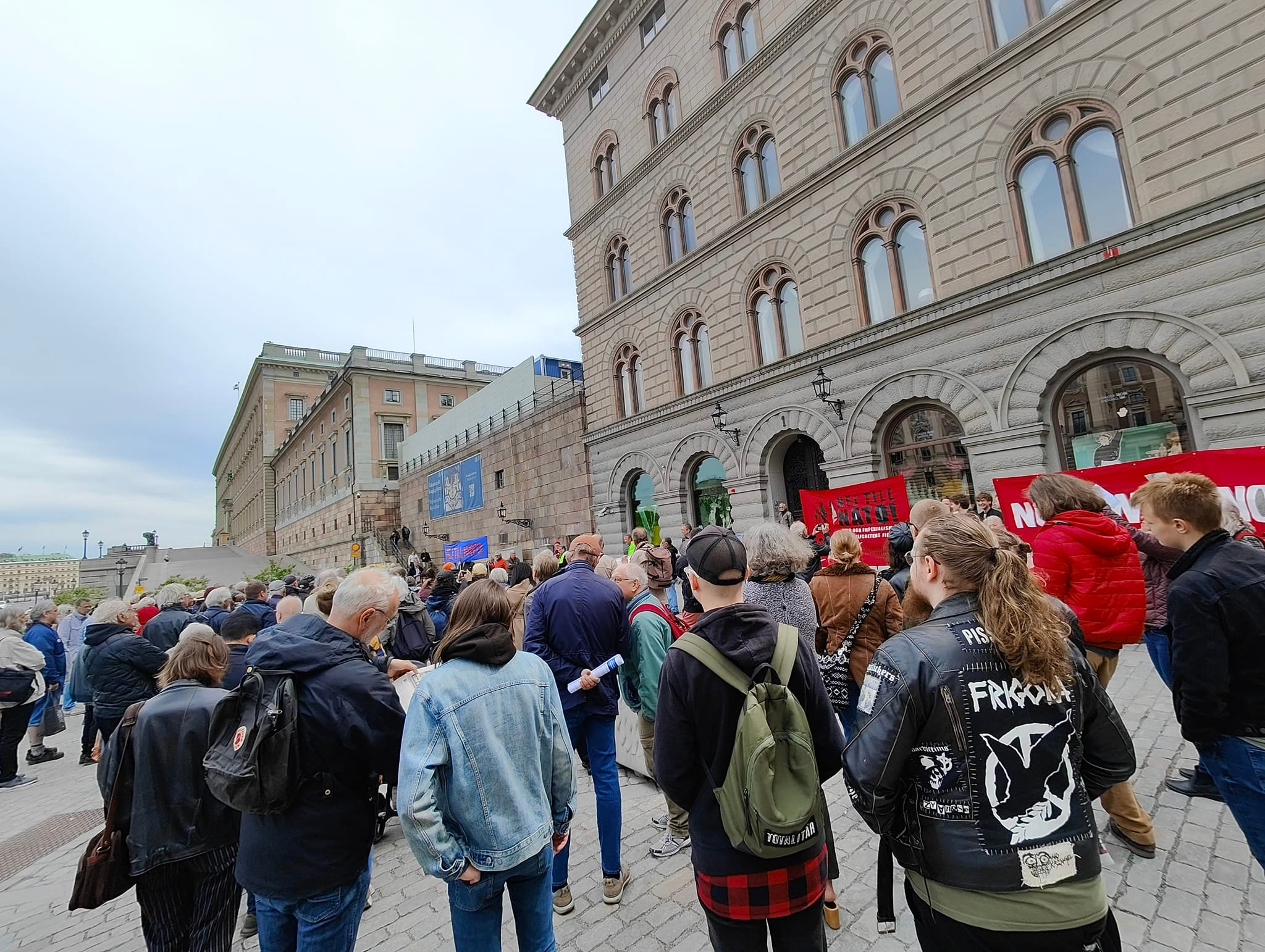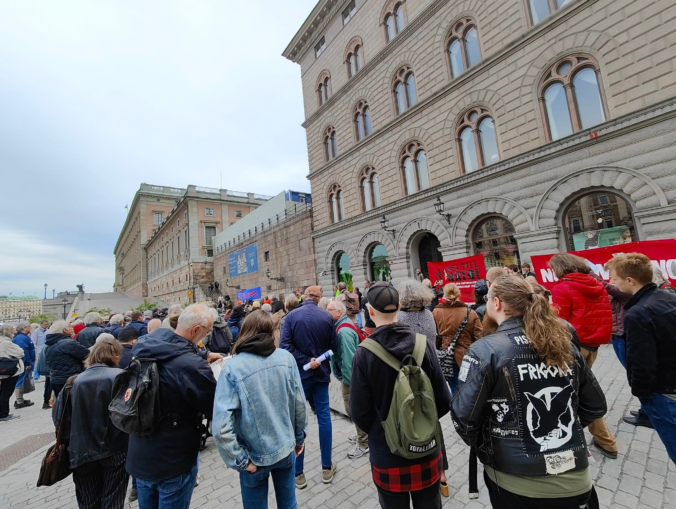

Demonstrators protest Sweden’s application for NATO membership. Stockholm, May 21. Credit: Mike Powers, Folket I Bild
The author is editor of the Portuguese web magazine jornalmudardevida.net, where the article was published May 18. Translator: John Catalinotto


Demonstrators protest Sweden’s application for NATO membership. Stockholm, May 21. Credit: Mike Powers, Folket I Bild
The planned enlargement of NATO to include Finland and Sweden is being hailed as proof of the strengthening and cohesion of the Western bloc and as a demonstration of the defeat of “Putin’s” plans, i.e., those of the Russian Federation. Add this to the daily clamors announcing a military victory of the Ukrainians and presaging an economic meltdown of Russia and even the possible overthrow of the Russian regime.
This Western vision of the situation is flawed, not only by a false optimism, typical of war propaganda (as is evident in the course of military operations), but also by the myopia that affects North Americans and Europeans when it comes to seeing events beyond the foam of the day or immediate gains.
The fiction of pure defense
NATO was born in 1949, contrary to what its promoters claim, as an aggressive military alliance. Its initial purpose, as we know, was to contain the political influence of the USSR in the aftermath of World War II. What was defensive was the creation of the Warsaw Pact, six years later in 1955, to respond to the rearmament of Germany, promoted by the U.S. and the resurgent Western Europe.
The 1991 dissolution of the Warsaw Pact, as everyone realizes, removed any remaining reason for NATO to continue to exist under the pretext of containing Soviet influence. Its continuation and extension to Eastern European countries (plus the failed attempts to add Ukraine and Georgia) are proof of its aggressive character. NATO has become the main instrument of U.S. imperialism to guarantee its hegemony in Europe and the world.
It is important to remember, in order to dispel the bizarre idea of a defensive military alliance, the aggressions and interventions of NATO since the United States felt that it had no worthy competitor, from 1991 onwards, beginning in Yugoslavia and ending in Afghanistan. Let’s also remember the intentions to replicate the model and to extend the Alliance’s range of action to Africa, the South Atlantic and Asia itself. All this — aggressions, “humanitarian” interventions, enlargement — have been in areas of the globe where Washington claims it has interests to “defend.”
No trace of democracy
The forces, policy orientation and decisions of NATO are nothing but the forces, the policy and the decisions of U.S. imperialism. There is no internal democracy within NATO that allows its members to freely decide what is in their interest if it is against what suits the U.S.
The actual military command is, without any sharing, in the hands of U.S. generals. The NATO summits are a sham of democracy to give legitimacy to decisions coming from Washington. The NATO secretaries-general are mere puppets directed from the Pentagon, as the fatuous Jens Stoltenberg makes abundantly clear.
Europeans pay for their “protection” like an unprotected shopkeeper pays a mafia gangster for security.
The integration of Finland and Sweden only represents the gain of two more pawns for the continuation of the same old policy, i.e., to assure the U.S. of its dominance over Europe in a worldwide chess match. At the present time, it is better to say: to secure the U.S. a buffer in its demise, in view of its inexorable decline in power over the world. And this aspect is of the utmost importance when evaluating events: The loss of economic and political capacity strengthens the aggressive tendency of U.S. imperialism, because it is in the military field that its superiority may still give it trump cards.
A subjugated and submissive Europe
In addition to not benefiting from any equal treatment vis-à-vis the United States and paying millions of euros into NATO’s budget, Europeans are obviously paying another price: political submission and lack of independence. The timid beginnings of France and Germany in seeking a so-called “strategic independence” (vis-à-vis the U.S., of course) were never more than sighs that are being drowned out by the U.S. counteroffensive in response to the war in Ukraine.
But to present this as a defeat of Russia — as even certain leftists argue to prove what they consider to be Putin’s “strategic error” in unleashing the war — is to put things upside down. On the contrary, it is the long (one might say historical) submission of the European rulers to Yankee imperialism that has made them unable to resist, not only throughout the post-World War II period, but also in the post-Cold War period and still in the face of the impending war in Ukraine. This is what made the EU a sub-imperialism subordinate to the larger interests of the U.S.
A logic of permanent confrontation
It was actually President Joe Biden and his cronies (following a task started by Obama in 2014) who did everything they could to exacerbate the conflict with Russia on Ukrainian soil, without the EU having the courage to raise its voice to curb U.S. extremism and seek to address Russia’s complaints. The fact that no one in the EU even attempted to distance themself from the U.S., as French President Jacques Chirac and German Chancellor Helmut Schröder did in 2003 in the face of the imminent attack on Iraq, is indicative of how dependent the EU is on Washington’s anti-Russian policy.
There is talk of defending Sweden and Finland. But neither of these countries have been threatened by Russia, which, for its part, would have every interest in those two countries remaining neutral, as we shall see later. In the logic of confrontation created by U.S. action, yes, the integration of the two countries into NATO is what will put them in the front line of a future possible conflict, just as it happened with Ukraine.
The security of Europe, which NATO is sworn to defend, is thus, on the contrary, shaken once again by changing the balance of power between NATO and Russia. By this means the U.S. is creating a new source of pressure on Russia, and even more so if it decides to place nuclear weapons in Finland, which shares a 830-mile border with Russia.
Preparing the ground since 2016
On a visit to Finland in July 2016, Russian President Vladimir Putin conferred with the Finnish president about the risks of the country joining NATO, a question that was already on the table at the time, and about the imbalance that this would again introduce in Europe.
At the time, the war was still far in the future, but the U.S. provocation of Russia using the Ukrainian regime against the people of the Donbass was increasing. At the same time, Washington was putting pressure on the two Nordic countries to join NATO in order to expand U.S. presence in the Baltic Sea and the Arctic, two other natural frontiers of Russia.
In a Finnish election campaign in April 2019, the debate about joining NATO was launched in order to test the resistance of and, if possible, win over the population. Politicians and commentators were then presenting this option as “fire insurance,” and President Sauli Niistro (the same one in office today) was sponsoring the idea as a “security enhancement” for Finland.
At the same time and accordingly, U.S. strategists were raising the possibility of extending the effects of Article 5 of the NATO treaty (mutual defense) to “close partners” such as Sweden and Finland, even if they do not formally belong to the Alliance. This maneuver was intended to circumvent the difficulties raised by public opinion opposed to joining NATO. The intentions only failed to materialize because at the time they lacked the support of “the population, the parliament and the foreign policy orientation,” as one Finnish party leader acknowledged. (Global Times, April 6, 2019)
From then to now, the work of convincing public opinions under the hammer of the “Russian threat” has unfolded, in order to present as the will of the peoples what in origin is the pure geostrategic interest of the U.S. rulers and the European ruling classes that serve them.
With NATO, there will never be security
Against those — politicians, commentators, propagandists — who start telling the recent history as if it began February 24 this year, it must be remembered that the U.S. has made Europe the main stage of its confrontation with the USSR and then with Russia for over 70 years. It is in the exclusive interest of the U.S. to keep the threats of war always active in order to put Russia under permanent pressure and additionally to subjugate its allies. The war in Ukraine is the latest episode of this confrontational policy.
The collaboration of the European powers in this decades-long maneuver puts the European peoples at the mercy of North American designs. In the present case, this submission can already be measured in the daily lives of the population by the increase in military spending, the rise in the cost of living and the threat of consumer shortages — all largely the result of the sanctions imposed on Russia.
Security in Europe — which fills the mouths of U.S. and European leaders but has not prevented them from promoting the aggressions they wanted whenever it interested them, starting with the destruction of Yugoslavia — cannot be achieved while it is NATO that determines the destiny of the peoples of the continent.
Stability and peace in Europe will always be precarious as long as the dispute between the interests of the capitalist-imperialist forces fighting there prevails. This is what the history of the last 70 years shows us, not to go any further. But even this relative stability and peace cannot be achieved without Russia, and even less against Russia — something that German Chancellor Olaf Scholz admitted in a rare moment of lucidity, which was soon forgotten in the name of “unity” with the U.S.
The surrender of the political leaders, without exception, and of the overwhelming majority of the political forces of the EU to U.S. control, leaves the peoples of Europe helpless. But it also makes them the only possible source of resistance to the war policy. That will be the sure basis for raising a movement to contest imperialism and NATO, its military arm.
The epic struggle of the Palestinian people against the full weight of U.S. imperialism and…
The following report comes from the Bronx Anti-War Coalition organizers on a protest held in…
In the Canadian federal elections held on April 28, the Liberals won with 169 seats…
The following is Part 2 of a talk given by the author to a meeting…
Boston Students, professors and workers are confronting the Trump administration’s fascist crackdown at universities across…
Philadelphia Within days of Swarthmore students reviving a pro-Palestinian encampment on April 30, police arrested…